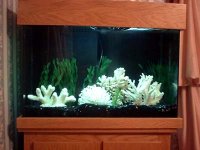I was wondering about this question.
Can any SPS diseases be treated by exposure to the air for a period of time?
Does exposure to uv or a simulated 'low tide' exposure to air help treat band diseases and such?
I'm sure someone somewhere has tried this before. I imagine exposure to air would be a great way for corals to rid themselves of parasites in nature.
Can any SPS diseases be treated by exposure to the air for a period of time?
Does exposure to uv or a simulated 'low tide' exposure to air help treat band diseases and such?
I'm sure someone somewhere has tried this before. I imagine exposure to air would be a great way for corals to rid themselves of parasites in nature.






